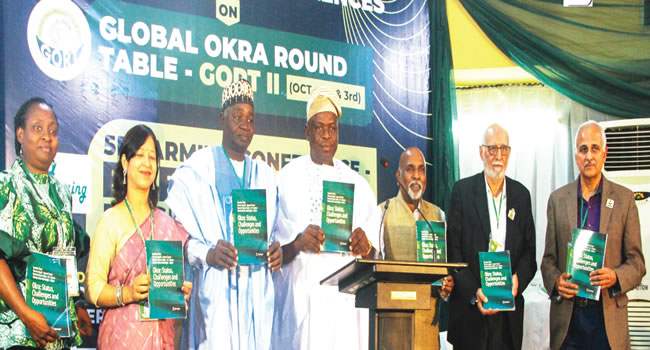The Federal Government of Nigeria, through the National Horticultural Research Institute (NIHORT), Ibadan, has made known its intention to boost the production of okro in the country.
As a result of this, the Federal Government has entered into a partnership with an Indian-based not-for-profit organisation, the Foundation for Advanced Training in Plant Breeding (ATPBR).
Speaking on the partnership, Executive Secretary, Agricultural Research Council of Nigeria (ARCN), Professor Garba Sharubutu, noted that okro is one of Nigeria’s favourite delicacy adding that the administration of President Bola Ahmed Tinubu placed more emphasis on the diversification of the economy hence the focus on extending attention from production of cash crops to food crops such as okro.
Sharubutu, who was speaking on the sidelines of the International Conferences on Global Okra Round Table 11 and 5F Farming Conference-Breeding for Resilience, hosted by NIHORT in conjunction with Foundation for Advanced Training in Plant Breeding (ATPBR), Maharashtra, in Ibadan, the Oyo state capital stated further that by concentrating on production of food crops, farmers in the country stand to gain from the various policies put in place by the federal government, stating that apart from helping towards the diversification of the economy it would help in achieving food sufficiency in the country.
He said: “Mr. President is more than interested in the diversification of the economy. We cannot just concentrate on production of cash crops alone. We need to also support and look at other staple food items. And most importantly, Okro. It can grow anywhere and any season.
“What we are doing is to promote production of Okro. Okro is our delicacy and having taken into consideration, the promotion of agricultural productivity and especially the declaration of emergency in food security by President Bola Ahmed Tinubu, I think it is something we have come to celebrate especially that we are making good as a research institute the intention of Mr President by inviting foreign partners to come and collaborate with us for the development of agricultural productivity.”
Professor Sharubutu, further said that: ”Nigeria is the second largest in terms of okro production but we are not yet there. We are not yet there because there are alot of potentials we have to undergo. Like we said, Mr President has insisted that no Nigerian must go to bed on an empty stomach.
“It is not about you getting the quantity of food, it is talking about you getting the quality of food. You cannot eat amala, eba and pounded yam without without having a lubricant that will lubricate any of these foods to go smoothly and okro is the in-thing.
“Okro is most acceptable in most part of this country. All the geo-political zones consume okro. And okro is such a food that you can actually develop into all forms of food. Moreso, Mr President is also interested in the diversification of the economy.
“We cannot just concentrate on cash crops, we are also suppose to look at other staple crops. Most importantly, okro can grow three to five times in a year, it can grow in the desert and anywhere. So, what we are doing is to promote okro in such a way that you have two or three cycles.
“And these two or three cycles will make agriculture more sustainable. Sustainable in the sense that in between the cultivation of yam, you will have okro maybe once or twice. So, the sustainablity of our own citizens are key and this is what this government is trying to promote.”
In his remarks, Minister of Agriculture and Food Security, Abubakar Kyari, who was represented at the event noted that: ”It is pertinent to note that okra has high nutritive value and costitutes a part of daily dietary need of many Nigerians at local and international levels as well as forms part of food security.
“Therefore, demand for okro and its products are on the increase across global market, including the industrilised nations where people resort more to natural health remedies.
“Though, okra production in Nigeria recorded an increase from 6 tons per hectare in 2003 to 8 tons per hectare in 2013, there has been a decline in Nigeria on the status to low resource productivity from inefficient use of resources, varied pest and diseases.
“I want to note that this training is timely and with its objective, focusing on breeding for resilience in Africa, will create awareness towards the nation benefitting from the resurgent global interest on healthy products.”
In his welcome address, Executive Director and Chief Executive Officer, NIHORT, Professor Muhammad Lawal Attanda, said: ”I am delighted that NIHORT is hosting this GORT II conference.”NIHORT in its efforts had released okra variety such as NHOKRA1 which is high yielding, early maturing with potential yield of 23.96t/ha and developed others such as LD 88 and NH47-4.
He said: “through innovative research methodologies, NIHORT aims to develop additional novel okra cultivars that not only meet market-driven demands, but also ensure sustainability in agricultural practices.”
Speaking on the partnership between its organisation and the Nigerian government, Conference Chairman and Director, Advanced Training in Plant Breeding (ATPBR), India, Dr Surinder K. Tikoo, stated that: ”The partnership is about making okro a global crop with help of NIHORT and we are working together on the latest research on okro and resilience breeding.
“In the last ten years, okro has become a global crop because of the fact that it can grow on various climatic conditions and it resistant to viruses. Okro leaves are used for vegetables, there are numerous importance of okro and that is why we are advocating its massive production.”
READ ALSO: Rivers crisis: Tell Wike to allow Fubara breathe, Bode George charges Tinubu






